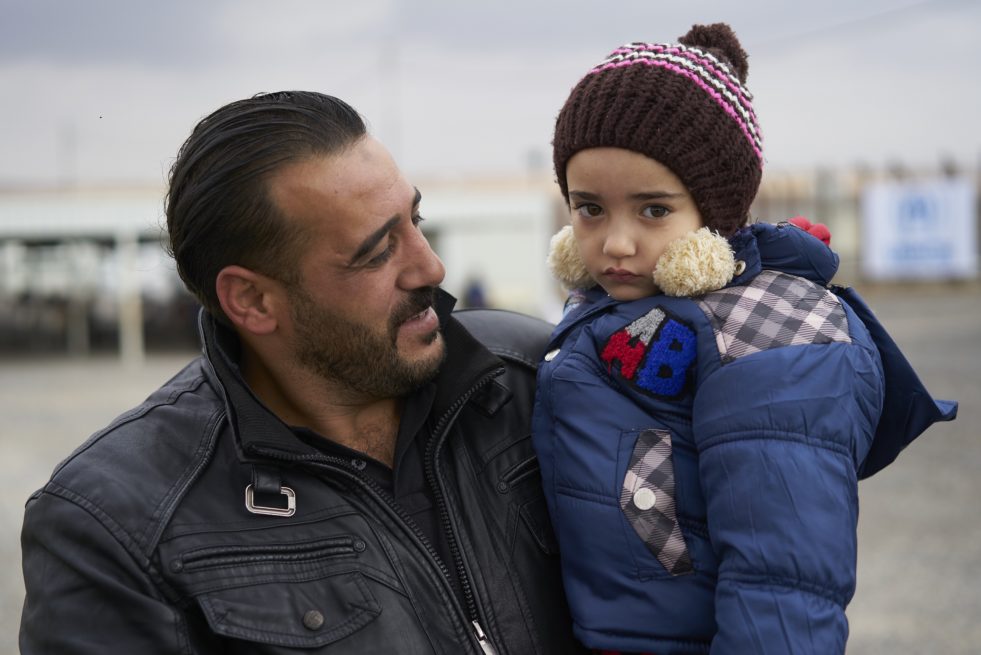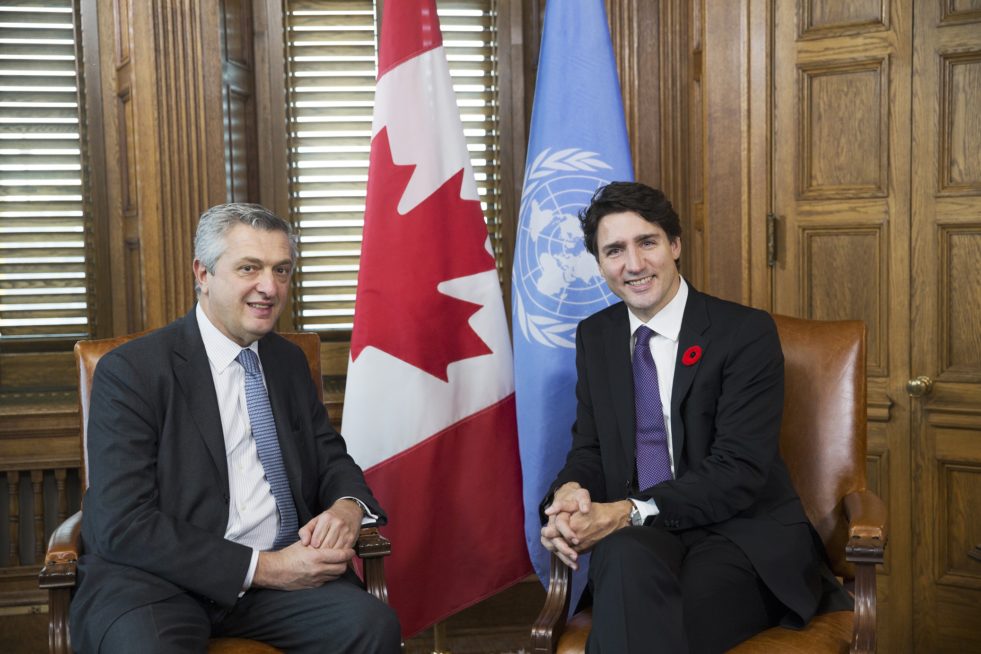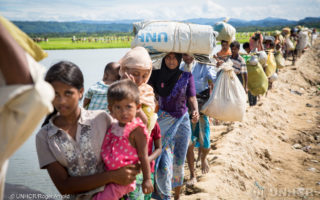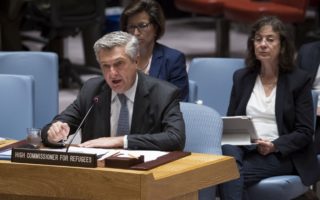
Syrian refugee Marseel, 30, carries his daughter Yaucot, 5, as they wait outside the new arrivals distribution point in Azraq refugee camp, Zarqa Governorate, Jordan.
Note to readers: This opinion piece was originally published in The Hill Times on 20 Dec 2017. Reprinted with permission.
By Jean-Nicolas Beuze, UNHCR Canada representative
Just a little over two years ago, three-year-old Alan Kurdi’s tragic death on a Turkish beach shocked the conscience of Canadians.
Over the following year, more than 26,000 Syrian refugees were welcomed into communities across the country, with government and private sponsors acting in partnership.
For a time, Canada’s generosity and innovation captured the world’s attention and admiration. Indeed, the United Nations High Commissioner for Refugees, Filippo Grandi, last month made his second visit to Canada in as many years. Grandi, my boss, sees in Canada a champion for refugees.
But this year is no different from 2015 or 2016. Indeed, it is even worse if you look at the numbers: more than 65 million forcibly displaced, including 22 million refugees. Therefore, while praising Canada for its
response to date, Grandi could but only ask Canadians and their political leaders to do even more.Of course, in part, he was recalling the capacity of Canada in past times of need to welcome even greater numbers (the 60,000 Indochinese in the 1970s, for example).But also on his mind were two ever-present concerns.
First, the increasing gap between the emergency needs of those 65 million displaced persons under his mandate—from clean water to safeshelter—and the financial resources provided to our organization, the
UN Refugee Agency (UNHCR).
And second, the troubling fact that in this time of unprecedented need, many governments capable of being champions are instead turning their backs on their international obligation to assist refugees. This has
particularly affected the 1.2 million refugees that we have identified as highest-priority for resettlement as a life-saving intervention.
In short, Canada stands almost alone these days in its solidarity with refugees, and so Grandi needs Canada more than ever to help lead the way back to our common humanity.
Some on Parliament Hill might wonder whether this is expecting too much. Hasn’t Canada done enough? But as Prime Minister Justin Trudeau told Grandi: “Canadians have realized that we have built an
extraordinary country. People are coming here and building a better future for themselves, and therefore for all of us.”

High Commissioner for Refugees Filippo Grandi met with Prime Minister Justin Trudeau in Ottawa during his visit to Canada in November 2017.
This is in fact the example that we want—and need—to show the world: not only is it possible to have a more generous refugee policy, it is in fact desirable. Beyond statistics on refugees’ economic and
integration successes, countless stories of refugees becoming integral parts of local communities are proof that the Canadian model works. It is a living success in a world in desperate need of answers for mass
displacement.
So much so that Canada now serves as a model to South American and European countries on how to involve communities in the integration of refugees. Amidst a massive global crisis, how often does the world
turn to Canada for answers? This is your time, Canada.
And what then of all the asylum seekers also turning to Canada, who have crossed irregularly from the United States? With some 20,000 arrivals over the past year, isn’t this refugee system getting out of
control, as some have charged?
Well, effective measures were taken by both federal and provincial authorities to guarantee access to the asylum system while maintaining regular security and health checks. In comparison to sudden refugee
influxes in other parts of the world—for example, at the peak of the Myanmar crisis, 50,000 Rohingyas were crossing into Bangladesh daily—the numbers are a fraction.
Before Canada’s Immigration and Refugee Board, they will have to demonstrate they cannot return home without facing persecution for who they are, or face conflicts that will necessarily, as civilians, put
them in danger. Some will pass the bar, other won’t.
In other words, Canada has demonstrated its capacity to receive these claimants with dignity and in an orderly manner. Contrary to alarmist warnings of imminent collapse, the asylum system did not break and
the borders remain secure and well managed. Compassion and humanity prevailed, and will do so again this coming year, if need be.
As Grandi wrapped up his visit to Canada last month, he met Efrem, a 23-year-old refugee from Eritrea now living in Ottawa, who told him: “Nobody dreams of becoming a refugee. It is a circumstance that you are forced to accept.”
Those circumstances for the vast majority of refugees, stranded in poor countries (some of them the children of the children of refugees who fled decades ago), are grim to terrible. In these desperate times,
Canada’s responsibility towards refugees globally cannot falter.
To paraphrase Winston Churchill, with great success comes great responsibility. This country, its people, and leaders, can, once again, make the difference that others hesitate to make. And in so doing, Canada can help them to overcome their fears and to rediscover their own responsibility towards refugees. This was Grandi’s message, and I know it will be heard.
– Jean-Nicolas Beuze is the United Nations High Commissioner for Refugees’ representative in Canada.
Note to readers: This opinion piece was originally published in The Hill Times on 20 Dec 2017. Reprinted with permission.



